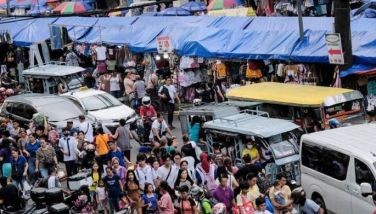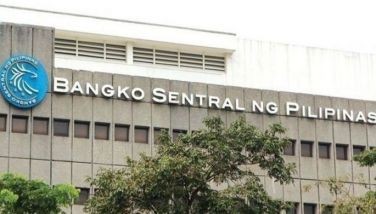Bancommerce, RCBC scramble to beat Sept deadline for SPVs
August 27, 2004 | 12:00am
Nearing the September deadline, the Bank of Commerce (Bancommerce) and Rizal Commercial Banking Corp. (RCBC) are speeding up the sale of their bad assets and forming their respective special purpose vehicles (SPVs) to avail of tax incentives from the government.
RCBC officials said they will likely put up two or three SPVs following the initial sale of P3.9-billion worth of its non-performing loans (NPLs) to Lehman Brothers.
It was only the second successful sale of bad assets via the SPV route after the Bank of the Philippine Islands (BPI) sold P8.6 billion of bad assets to Morgan Stanley Emerging Markets Inc. last July.
Bancommerce, on the other hand, will try to dispose of a smaller amount of P1.9 billion in bad assets after the public auction of P12.5 billion worth of non-performing loans (NPLs) and idle properties failed early this week.
"We have already enrolled the P1.9-billion assets for sale with the Bangko Sentral ng Pilipinas (BSP)," Bancommerce head for executive staff sector Arturo E. Manuel Jr. said.
The bank will then register the SPV with the Securities and Exchange Commission (SEC). Under the SPV Law of 2002, all SPVs must be registered with the SEC on or before Sept. 14 this year to be able to avail of the tax and other incentives offered.
Manuel said that the bank would likely register a SPV even before it enters into an agreement with any asset management company (AMC).
"If we have the vehicle, the bank actually bought time to enjoy the perks or incentives. When we are ready to do that, then that is time to negotiate," he added.
The P1.9-billion bad asset package consists of NPLs and real and other properties owned and acquired (ROPOA). Bancommerce has a total of P5 billion in NPLs and roughly P2.2-billion in ROPOA.
RCBC, on the other hand, has total non-performing assets (NPAs) of P24 billion, similarly consisting of NPLs and ROPOA.
RCBC president Francisco S. Magsajo confirmed that they are forming "buckets" of bad assets, which will eventually be the same components of the SPVs that would be disposed. Each SPV must have a minimum capital of at least P31 million.
Registering two or three SPVs with accompanying "buckets" of bad assets would allow the bank to avail of the incentive packages under the law even if they have not finalized any deal with an AMC.
RCBC officials said they will likely put up two or three SPVs following the initial sale of P3.9-billion worth of its non-performing loans (NPLs) to Lehman Brothers.
It was only the second successful sale of bad assets via the SPV route after the Bank of the Philippine Islands (BPI) sold P8.6 billion of bad assets to Morgan Stanley Emerging Markets Inc. last July.
Bancommerce, on the other hand, will try to dispose of a smaller amount of P1.9 billion in bad assets after the public auction of P12.5 billion worth of non-performing loans (NPLs) and idle properties failed early this week.
"We have already enrolled the P1.9-billion assets for sale with the Bangko Sentral ng Pilipinas (BSP)," Bancommerce head for executive staff sector Arturo E. Manuel Jr. said.
The bank will then register the SPV with the Securities and Exchange Commission (SEC). Under the SPV Law of 2002, all SPVs must be registered with the SEC on or before Sept. 14 this year to be able to avail of the tax and other incentives offered.
Manuel said that the bank would likely register a SPV even before it enters into an agreement with any asset management company (AMC).
"If we have the vehicle, the bank actually bought time to enjoy the perks or incentives. When we are ready to do that, then that is time to negotiate," he added.
The P1.9-billion bad asset package consists of NPLs and real and other properties owned and acquired (ROPOA). Bancommerce has a total of P5 billion in NPLs and roughly P2.2-billion in ROPOA.
RCBC, on the other hand, has total non-performing assets (NPAs) of P24 billion, similarly consisting of NPLs and ROPOA.
RCBC president Francisco S. Magsajo confirmed that they are forming "buckets" of bad assets, which will eventually be the same components of the SPVs that would be disposed. Each SPV must have a minimum capital of at least P31 million.
Registering two or three SPVs with accompanying "buckets" of bad assets would allow the bank to avail of the incentive packages under the law even if they have not finalized any deal with an AMC.
BrandSpace Articles
<
>
- Latest
- Trending
Trending
Latest
Trending
Latest
Recommended






























